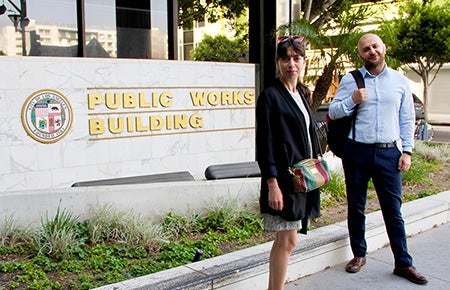
Visiting Armenian policy fellows work with the City of L.A. to jumpstart change at home
In the quarter century since gaining independence from the Soviet Union, the Republic of Armenia has struggled to establish a stable and genuine democratic government. Last year’s “velvet revolution,” one of the most peaceful regime changes in the country’s history, offered many new hope. But challenges are many, and the country continues to navigate the opportunities and obstacles that come with the transition to a democratic government.
To tackle these challenges, Los Angeles Mayor Eric Garcetti, L.A. Councilmember Paul Krekorian, and USC Dornsife teamed up with the government of Armenia to form the USC Institute of Armenian Studies Policy Fellows Program.
“This fellowship brings public servants from Armenia to observe, engage with, learn from and contribute to the work of various L.A. city departments,” said Salpi Ghazarian, director of the USC Institute of Armenian Studies. “It’s a program that bridges the intellectual capacities of the university, the administrative and governance capacity of the City of Los Angeles, and the new, exciting needs of the government of Armenia.”
The program responds to the historical changes currently occurring in the Republic of Armenia.
“The world expected post-Soviet societies to naturally transition to functioning democracies,” said Ghazarian, “forgetting that the frameworks that make for effective, participatory governance don’t exist there.”
To help Armenia approach sustainable governance, the Institute of Armenian Studies invites mid-career public servants to L.A. to experience the inner workings of a democratic society. Intended to facilitate an open dialogue between Armenian and American policymakers, the fellows program encourages the two governments to learn and grow from one another.

USC Dornsife Institute of Armenian Studies Policy Fellows Anna Aktaryan, left, and Davit Shindyan. (Photo: Courtesy of Salpi Ghazarian.)
Anna Aktaryan and Davit Shindyan were the first two fellows to make the trek from Armenia. Aktaryan and Shindyan spent the Fall 2018 semester working with the city’s planning and public works department and sanitation department, respectively.
“In [Shindyan’s] case, he benefited not just from the available research and observing the city’s processes, but also from meeting with innovators and entrepreneurs in a quickly changing sector,” said Ghazarian.
When not working directly with the city, the fellows spent time at USC, interacting with the faculty and research centers on campus offer policy solutions through an academic lens. Using academia to understand the larger context of Armenia’s governance challenges and the skills picked up from their work, the fellows will return home to share what they’ve learned to help jumpstart change.
With the second cohort of policy fellows arriving in late February, Ghazarian has high hopes for the future of the program.
“In general, this is a most direct path between scholarship, USC and global impact,” she said. For Armenia, in this crucial moment in its history, the lessons gained from the program promise to be revolutionary.